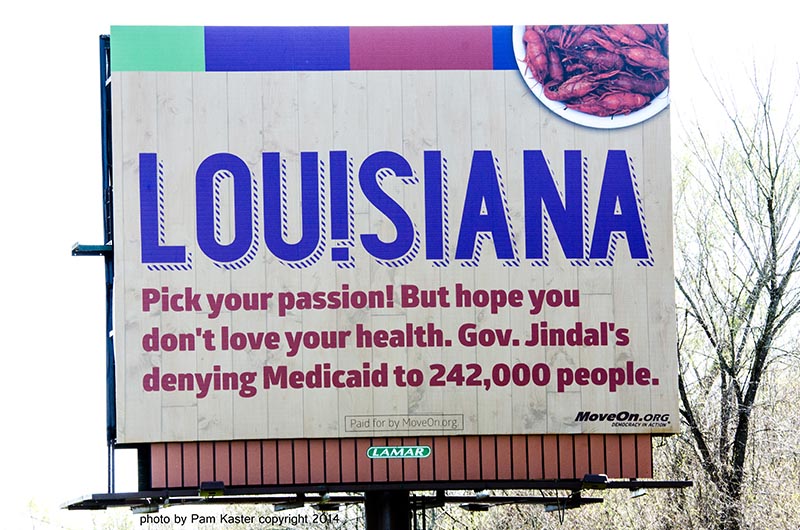The Office of the Lieutenant Governor for Louisiana owns a state trademark registration for LOUISIANA PICK YOUR PASSION:
The Louisiana Department of Culture, Recreation and Tourism, which is under the Office of the Lieutenant Governor, also registered the word mark PICK YOUR PASSION with the United States Patent and Trademark Office.
MoveOn.org used the trademark* on a billboard critical of the Governor of Louisiana:
If you can’t read it, the billboard says “Pick your passion! But hope you don’t love your health. Gov. Jindal’s denying Medicaid to 242,000 people.”
Because politicians do not appear to be able to take criticism gracefully, the Lieutenant Governor** sued MoveOn.org for trademark infringement. One argument was that since the Lieutenant Governor was the owner of the mark, it was not a lawful parody because the Governor, not the Lieutenant Governor, was the target of the message.
So that’s an interesting concept—is it true that the “parody”*** use of a trademark has to be about the owner of the mark?
According to the court, no:
First, viewers would have to know that the service mark in question is a creation of and sponsored by the Lieutenant Governor’s Office. There is no evidence of this. Furthermore, neither the Lieutenant Governor himself, nor the Office of the Lieutenant Governor as an agency of the State, is the owner of the mark. The owner of the mark is the State, and more specifically its citizens.[****] Hence, the Court is being asked to find that viewers of the billboard are likely to believe that the State, as the owner of the service mark, is being critical of the Governor. The State argues that MoveOn.org’s billboard does not criticize the owner of the mark, the State of Louisiana, but rather it criticizes Governor Bobby Jindal. Essentially, the State argues that the target of MoveOn.org’s parody (Governor Jindal) is not the holder or owner of the mark (the State). The question is whether the disconnect between the owner of the mark and the target of the parody creates viewer confusion. In other words, is a motorist viewing the billboard likely to conclude that the State of Louisiana is criticizing Governor Jindal. The Court thinks not.
It doesn’t matter who the owner is because the question is whether anyone is confused and clearly, here, no one would be. But you can see what an aggravating problem it could be for an otherwise-uninvolved trademark owner. What if the billboard had said “Can You Hear Me Now? Vote Gov. Jindal out of office for denying Medicaid to 242,000 people.” I suspect the likelihood is low that anyone would think that Verizon was related to an ad critical of the Governor of Louisiana, but Verizon would nonetheless be unhappy about it.
And as you would expect here, the court held the MoveOn.org billboard was protected speech under the First Amendment.
Dardenne v. MoveOn.org, No. 14-00150-DDD-SCR (M.D. La. April 7, 2014).*****
*And did kind of a lousy job copying “Louisiana.” The state registration specifically claims that both letters “I” in “Louisiana” are replaced with exclamation marks, but MoveOn.org only replaced one. Lousy replication of the font, too, but good enough to make the point.
**I’m not sure why the Louisiana Department of Culture, Recreation and Tourism, owner of the federal registration, wasn’t also named as a plaintiff, although, as will be discussed, the court sorts out that problem.
***I say “parody” because that’s what the parties argued. I don’t see how this is a parody. There’s nothing “comic” whatsoever about the billboard, but, hey, it’s how the parties and court talked about it so we’ll go with it.
****Thus, the Department of Culture, Recreation and Tourism probably didn’t need to be named as a plaintiff. Although I wonder what the PTO would think about the validity of the registration if the State is actually the owner.
*****Any guesses why the State filed in federal court instead of state court?

The text of this work is licensed under a Creative Commons Attribution-No Derivative Works 3.0 United States License.



Leave a Reply